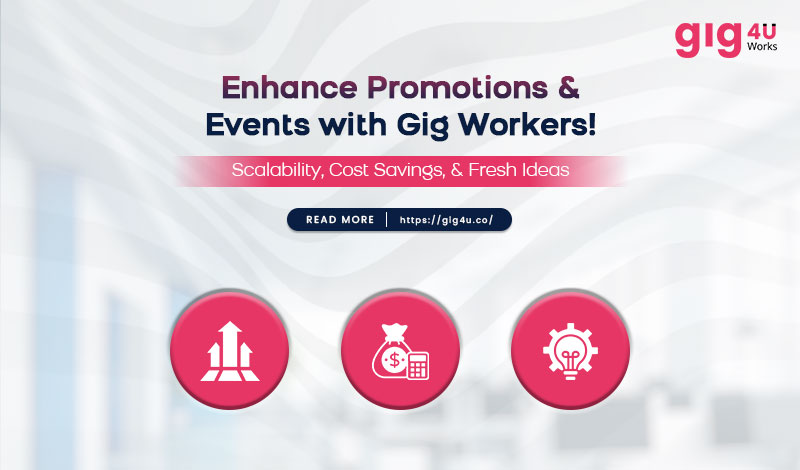In today's dynamic business landscape, agility and responsiveness are key differentiators. Traditional full-time workforces can struggle to adapt to fluctuating demands, particularly for short-term projects or sudden surges in activity. This is where gig workers – the independent contractors and freelancers who make up the growing gig economy – emerge as a strategic solution.
The Power of the Gig Workforce
The gig economy offers a vast pool of talent with diverse skill sets. Businesses can tap into this flexibility to scale their workforce up or down as needed. This is especially beneficial for:
- Promotions and Events: Product launches, marketing campaigns, and trade shows often require a temporary increase in manpower. Gig workers can fill these gaps, providing expertise in areas like brand promotion, event execution, social media management, or customer service.
- Seasonal Fluctuations: Retail stores, restaurants, and hospitality businesses experience peak periods throughout the year. Gig workers can supplement the core workforce during these times, ensuring seamless operations and exceptional customer service.
- Specialized Projects: Businesses may require specific skills for one-off projects, like website development, data analysis, or content creation. Hiring gig workers allows them to access this expertise without incurring long-term commitments.
Beyond Filling the Gaps: Strategic Advantages
The benefits of utilizing gig workers go beyond simply filling temporary staffing needs. Here's how they can become a strategic workforce lever for promotions and events:
- Cost-Effectiveness: Hiring gig workers eliminates the need for employee benefits, payroll taxes, and training costs associated with full-time staff. This allows for efficient budget allocation during peak periods.
- Fresh Perspectives: Gig workers bring in diverse experiences and skill sets, fostering innovation and creativity. This can be invaluable for brainstorming promotional campaigns or developing unique event experiences.
- Scalability: The gig economy offers a readily available talent pool. Businesses can quickly scale their workforce to meet specific project requirements without lengthy recruitment processes.
- Faster Time-to-Market: With gig workers readily available, businesses can launch promotions and events quicker, capitalizing on fleeting market opportunities.
Building a Strategic Gig Workforce Strategy
To leverage the full potential of gig workers for promotions and events, businesses need a well-defined strategy. Here are some key considerations:
- Platform Selection: Several online platforms connect businesses with gig workers. Choose a platform that caters to your specific industry and skill needs. Consider factors like worker vetting procedures, project management tools, and payment security.
- Clear Job Descriptions: Clearly define project requirements, desired skill sets, and performance expectations in your job postings. This ensures you attract the right talent and avoid misunderstandings.
- Effective Communication: Maintain open communication channels with gig workers. Provide clear instructions, and timely feedback, and acknowledge their contributions. This fosters a positive working relationship and encourages repeat engagements.
- Performance Management: Develop a system to evaluate gig worker performance. This could involve client feedback, project completion rates, or quality metrics. Use this data to build trust and identify top performers for future projects.
Building a Win-Win Partnership
A successful gig workforce strategy hinges on creating a mutually beneficial partnership. Here's how to ensure both businesses and gig workers thrive:
- Competitive Compensation: Offer competitive rates that reflect the worker's skills and experience. Consider bonuses or incentives for exceeding expectations.
- Clear Payment Terms: Establish clear and timely payment terms to ensure gig workers receive their compensation promptly. Online payment platforms can streamline this process.
- Training and Support: Provide access to relevant training resources or support materials to help gig workers excel in their roles. This demonstrates your commitment to their success.
- Building Relationships: Treat gig workers as valued partners, not just temporary hires. Recognize their contributions and build long-term relationships for future collaborations.
Conclusion
The gig economy presents a strategic opportunity for businesses to optimize their workforce for promotions and events.
By leveraging the flexibility, skills, and cost-effectiveness of gig workers, businesses can gain a competitive edge in today's dynamic market.
By fostering a win-win partnership with this growing workforce segment, companies can unlock innovation, agility, and a path to sustainable success.




